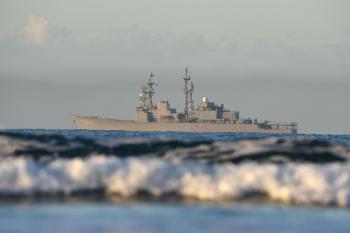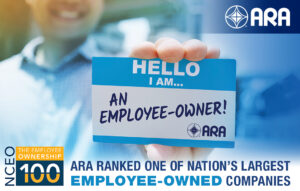
U.S. Navy Completes Sea Trial with ARA’s 100% Drop-in Renewable Diesel Fuel
For the first time ever a Navy ship has operated on a 100 percent drop-in renewable diesel fuel. Naval Surface Warfare Center, Port Hueneme Division’s (NSWC PHD) Self Defense Test Ship (SDTS) completed final-phase testing of a 100% drop-in renewable diesel fuel as part of the Navy’s MILSPEC qualification program. ReadiDiesel™ was developed by Applied Research Associates (ARA) and Chevron Lummus Global, as a drop-in replacement for petroleum F-76 marine diesel. ReadiDiesel™ is a 100% renewable biofuel.
The SDTS took on approximately 18,000 gallons of ReadiDiesel™ in San Diego, California. The objective of this particular test was twofold: first, to demonstrate that ReadiDiesel™ is a drop-in replacement for petroleum-sourced F-76 marine diesel, meaning that it requires no blending with petroleum-derived fuels, equipment modifications or operational modifications by the crew; and second, to ensure that this renewable fuel performs equally to, or better than, existing petroleum-derived fuels. The renewable diesel fuel powered the Self Defense Test Ship’s General Electric LM-2500 gas-turbine engine and a Rolls Royce 501 K-17 gas-turbine generator.
The test period lasted approximately 12 hours along the Southern California Coast, while enroute from San Diego to Port Hueneme. Navy engineers monitored the performance of the gas-turbine engines and generators while running on petroleum F-76 prior to taking on the ReadiDiesel™ to establish a baseline for comparison. While operating on 100% ReadiDiesel™, the ship successfully completed multiple engine starts and speed changes. There were no mechanical, operational or qualitative differences when operating on ReadiDiesel™.
The data collected from the trial will be fully analyzed and the results summarized in a final report. Prior to testing aboard the SDTS, ReadiDiesel™ went through fit-for-purpose, component, and full-scale engine testing. The component and full-scale engine testing included performance tests to determine the combustion quality and emissions. In all, ARA provided 79,000 gallons of ReadiDiesel™ for the test program.
ReadiDiesel™, termed Catalytic Hydrothermolysis Conversion Diesel (CHCD-76) by the Navy, is a military grade drop-in replacement for traditional F-76 that is produced from fats, oils, and greases by the Biofuels ISOCONVERSION™ process. ReadiDiesel™ has the same molecular composition, boiling range distribution, and physical and energy density as petroleum fuels while producing lower emissions than the petroleum counterpart. ReadiDiesel™ also reduces greenhouse gas emissions by 80% compared to petroleum.
The Department of the Navy has pursued introducing drop-in renewable diesel to its operational supply as a means to increase operational flexibility and energy security. Alternatives to traditional petroleum can equip mission planners and commanders with more options, as well make the service’s supply lines more secure.
“WE ARE EXCITED TO WORK WITH THE U.S. NAVY AS IT TAKES THIS IMPORTANT STEP TOWARD THE USE OF 100% DROP-IN RENEWABLE DIESEL FUEL IN ITS SHIPS. OUR RENEWABLE FUELS CONTINUE TO PROVE THEIR VIABILITY AS 100% REPLACEMENTS FOR PETROLEUM IN DIESEL AND JET FUEL APPLICATIONS, AND WE LOOK FORWARD TO THE OPPORTUNITY TO WORK WITH OUR NAVY PARTNERS TO SUPPORT THEIR OPERATIONAL NEEDS. OUR GOAL REMAINS TO BE ABLE TO PROVIDE AN ALTERNATIVE, UNBLENDED RENEWABLE FUEL THAT INCREASES OUR NATION’S ENERGY SECURITY AT PRICES COMPETITIVE WITH PETROLEUM.” -CHUCK RED, VICE PRESIDENT OF FUELS DEVELOPMENT FOR ARA
The project was a collaborative effort involving the Deputy Assistant Secretary of the Navy Energy Office (DASN Energy), Naval Sea Systems Command (NAVSEA), Naval Air Systems Command (NAVAIR), Naval Supply Systems Command (NAVSUP), Defense Logistics Agency (DLA), NSWC PHD and NSWC Philadelphia Division. Each organization that provided support to the test is involved in either Department of Defense or Department of the Navy energy initiatives. The SDTS is an asset of NSWC PHD. An all-civilian Port Hueneme crew of approximately 40 personnel operated the vessel while underway. Approximately 7 additional personnel rode the vessel in support of the test.
In addition to the MILSPEC certification of ReadiDiesel™, the Navy continues to test ARA and Chevron Lummus Global’s ReadiJet™ as a 100% drop-in renewable jet fuel. Fit for purpose, component, and full engine testing are concluding, and flight testing in a Navy EA-18G Growler is planned for early fall.
Reduction in emissions is just one of the positive environmental impacts of ReadiDiesel™ and ReadiJet™ fuels. The Biofuels ISOCONVERSION™ process can use waste such as yellow grease from rendering facilities, used cooking oil, and brown grease recovered from grease traps as feedstocks. In addition to being compatible with current turbine and diesel engines, ReadiDiesel™ and ReadiJet™ do not have to be segregated from their petroleum counterparts. These fuels can utilize existing petroleum infrastructure without the need to build additional, costly infrastructure for blending, transportation, and storage.
ARA and Chevron Lummus Global are currently engineering the first commercial-scale Biofuels ISOCONVERSION refinery for its licensee, UrbanX Renewables Group. The 5,000 barrel-per-day refinery will be located in Southern California and will produce renewable diesel, jet, and naphtha from ultra-low carbon intensity waste oil feedstocks. “We are continuing to take important, deliberate steps toward our goal of commercial scale production of 100 percent drop-in diesel and jet fuel from waste oils at prices competitive with their petroleum counterparts,” said Red.
About Chevron Lummus Global (CLG)
Chevron Lummus Global (CLG), a 50/50 joint venture between CB&I and Chevron, licenses refining and hydroprocessing technologies and catalyst systems worldwide for production of clean fuels and high-quality lubricant base oils CLG’s research and development staff is continuously seeking advancements in catalyst and technology that will improve operating economics. CLG is the leading Process Technology Licensor for Alternate Sources of Fuels including: Oil Sands Bitumen, Shale Oil, Biofuels, and Extra Heavy Oils. For more information please visit: http://www.chevrontechnologymarketing.com/about_che_tech.aspx.



